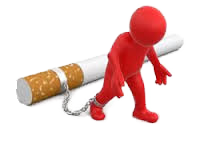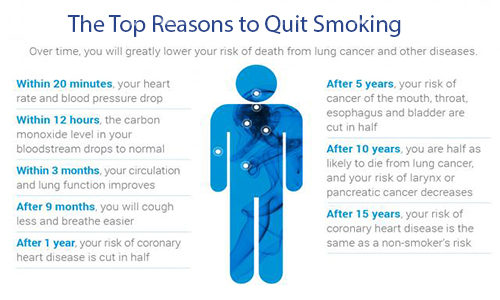Prepare To Quit Smoking
Congratulations! You’ve decided to quit smoking. This is one of the best things you can do to improve your overall health and add years to your life. Non-smokers generally live longer than people who continue to smoke.
Deciding to start quitting may make you anxious. But your chances will be better if you get prepared first. Stopping Smoking works best when you’re prepared. Before you quit, START by taking these five important steps:
S = Set a quit date.
T = Tell family, friends, and coworkers that you plan to quit.
A = Anticipate and plan for the challenges you’ll face while quitting.
R = Remove cigarettes and tobacco products from your home, car, and work.
T = Talk to a friend who will be your support person.
Quitting smoking isn’t easy but millions of people have quit over the past several years. Many more are seriously thinking of quitting due to the fact that they are more aware of the dangers of smoking. Public opinion has also had an impact, as has second hand smoke issues. Check out these tips. They will surely prepare you in your quest to becoming smoke-free!
List all the reasons you want to stop. Every night before going to bed, repeat one of the reasons 10 times.
- Decide positively that you want to stop. Try to avoid negative thoughts about how difficult it might be.
- Develop strong personal reasons to stop in addition to your health and obligations to others. For example, think of all the time you waste taking cigarette breaks, rushing out to buy a pack, hunting for a light etc., or of all the money you’ll save.
- Begin to condition yourself physically: start a modest exercise program; drink more fluids; get plenty of rest; avoid fatigue.
- Have realistic expectations — stopping isn’t easy, but it’s not impossible either. More than 3 million Americans stop smoking every year.
- Understand that withdrawal symptoms are temporary and are healthy signs that the body is repairing itself from its long exposure to nicotine. Within 24 hours of abrupt smoking cessation, withdrawal symptoms may appear as the body begins its healing process.
- Relapses occur in the first week or two after stopping, when withdrawal symptoms are strongest and your body is still using all your personal resources. Willpower, family, friends, and any tips that work for you will help you get through this critical period successfully.
- Bet a friend you can stop on your target date. Put your cigarette money aside every day, and forfeit it if you smoke. (But if you do smoke, don’t give up; simply strengthen your resolve and try again.
- Ask your partner or friend to stop with you.
- Tell your family and friends that you’re stopping and when. They can be an important source of support both before and after you stop.
Start a Smokers Diary
By keeping a smoker’s diary, you will accumulate over time, all of your smoking reasons and habits in writing. Having all these written down in your own handwriting will allow your mind to more easily identify and comprehend why you smoke, and what you need to do in order to overcome your addiction.

